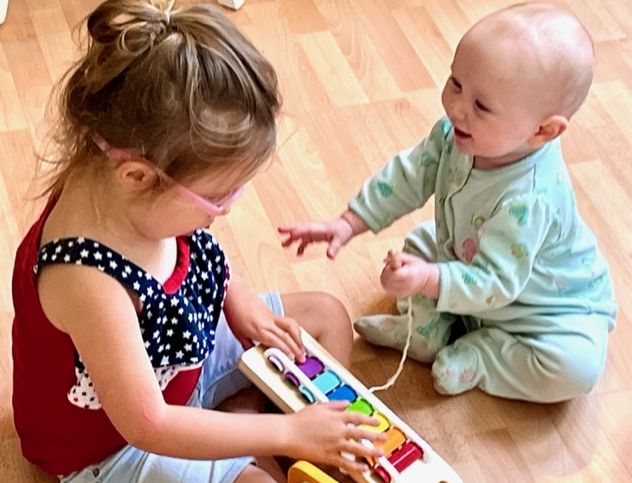The Blindness of Beauty
I remember being enamored in my undergraduate days with the philosophy of beauty for beauty’s sake. I was undeniably drawn to the idea that beauty had inherent worth despite its alleged lack of utilitarian value. I even disputed this idea, arguing that beauty as a psychological construct serves to orient volition towards the good, as beauty most often occurs in that which is necessary to human survival, i.e. food, water, oxygen (plant-life), or the human body vis-à-vis sexual attraction.
I remember finding a newborn Lizzy so entrancingly beautiful that all I could do for weeks was look at her, nurse her, and kiss and cuddle her. As she continued to grow and I could use the advantage of time to compare pictures of her, I was shell-shocked by how thin and unlike herself she looked in those first months of life. But by the time she was one, she was staggeringly beautiful, and her beauty only continued to deepen as the months passed. I could not take enough pictures of her, and when I kissed her or played with her, there was an urgent undercurrent to our interactions warning me that each kiss or laugh or touch would never even approach the horizon of enough.
When Cecilia was six months old, I remember giving her a tearful massage to keep her calm as I told my big sister that if the worst case scenario happened and Cecilia was blind, that I didn’t know how to cope with the fact that I could never even show her what Lizzy looked like. And how could I ever describe to her what the sun looks like sinking into the ocean or how incredibly green Ireland is from the sky or how beautiful she will look on her wedding day? How could my vaunted mastery of language even come close to describing the entire world to a child who simply has never seen it?
As time passes and it becomes more and more clear that Cecilia has some limited vision, I have been thinking a great deal about the nature of beauty. Mostly, I wonder if something has to be seen in order to be beautiful. At first, this seems easily answered by the manifold proof that beauty can exist within behaviors, ideas, and sounds. However, there also exists an indivisible relationship between beauty and the human capacity for sight as a means of encountering the world.
How does beauty intersect with a blind child? This question plagues me every time I tell Cecilia how beautiful she is and she responds with a smile so consuming it seems to flood through her entire body. I have to catch myself during our bike rides when we pass a herd of deer grazing in a glen, and I want to point out their silent grace to Cecilia. Every time I hear someone say “I want to see” in reference to travel, I try to translate it to “I want to feel” and pretend that the latter can even begin to compensate for the former.
Sometimes the sheer magnitude of the responsibility of raising Cecilia comes abruptly home to me, and I feel like curling up in a corner and sobbing to the darkness that I don’t know what I’m doing. Other times, the night is more comfort than curse, as neither she nor I need sight to curl close together, whisper sighs and lullabies, and feel belonging.
I think I am bolstered by the reality that beauty is not bounded by vision. I think I can register the beautiful with my other four senses without needing sight to confirm it. I think the beauty of Cecilia hugging me tightly with all four limbs is only ever felt because I always close my eyes in joy and surrender whenever it happens.
I have not had the strength to look at photos of Lizzy since I put together a slideshow for her wake, but her beauty remains a fixture in my brain like a constellation of symmetry broken only by grief. Without trying, I can see the sun glinting off the fine-spun gold of her hair or drown in the luminescent aquamarine of her eyes. I can remember exactly what it felt like to walk while holding her hand or how her body would shift from the tense participation of being held to the warm density of sleep. But mostly, I associate the word “beautiful” with Lizzy because of the mutual belonging we experienced throughout those short two years of her life.
If beauty does not need to be seen to be real, one might argue that Lizzy does not need to be living to be beautiful. Whatever makes up Lizzy now is so far beyond our capacity to understand that we fear to give it voice or name, and yet, I think we can say it is beautiful. I think we can say that Lizzy both embodied and deepened the very nature of beauty when she was living, and that her beauty remains even though blood no longer moves through her body. I think beauty, by its nature, has to be connected to eternity, and in this sense, Lizzy was, is, and ever shall be beautiful.
I think I should worry less about communicating Lizzy’s beauty to Cece one day. I think Cece has a way of teaching me exactly how beautiful her own life is in all its brokenness. And I think that maybe the most beautiful things are beyond the scope of vision anyway.


I guess beauty can be both “skin deep” and on the surface. Perhaps, they are fundamentally different types of beauty.
All I know is that all three of you are magnificently beautiful….
Love you. Dad